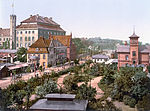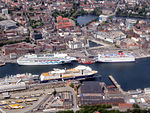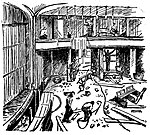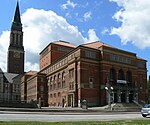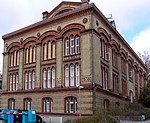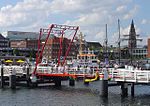St. Nikolai, Kiel
Buildings and structures in KielGothic hall churches in GermanyLutheran churches in Schleswig-Holstein

St. Nikolai is the name of a Protestant parish and its church in Kiel, the capital of Schleswig-Holstein, Germany. It is the town's oldest building, at the Alter Markt. It was dedicated to Saint Nicholas. In the 19th century, it was remodeled in Gothic Revival style. Destroyed in World War II, it was rebuilt with a simpler contemporary interior. It features notable artworks such as a bronze baptismal font from 1340, an altar from 1460, a triumphal cross from 1490, a wood-carved pulpit from 1705, and outside a bronze by Ernst Barlach from 1928.
Excerpt from the Wikipedia article St. Nikolai, Kiel (License: CC BY-SA 3.0, Authors, Images).St. Nikolai, Kiel
Nikolaikirchhof, Kiel Altstadt
Geographical coordinates (GPS) Address External links Nearby Places Show on map
Geographical coordinates (GPS)
| Latitude | Longitude |
|---|---|
| N 54.322777777778 ° | E 10.14 ° |
Address
Sankt Nikolai zu Kiel
Nikolaikirchhof
24103 Kiel, Altstadt
Schleswig-Holstein, Germany
Open on Google Maps



